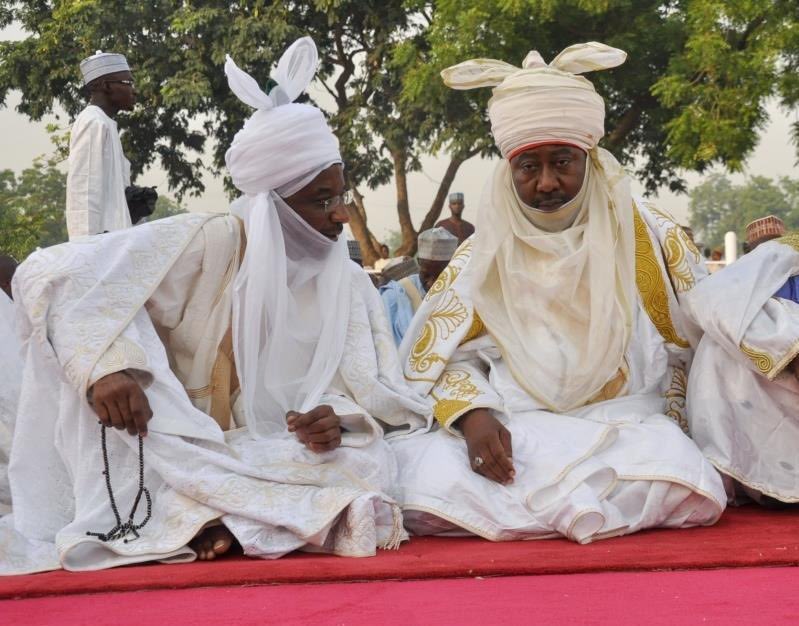Lamido Sanusi and Aminu Ado Bayero, the deposed king, are cousins, bound by a complex web of family ties. Aminu Bayero’s sister, the daughter of the former Emir of Kano, Ado Bayero, is married to Lamido Sanusi, making them in-laws. Yet, this close-knit family is embroiled in a bitter kinship dispute.
The roots of this conflict date back to the reign of the late Ado Bayero, who had designated his eldest son, Sanusi Bayero (Ciroma), as his successor before his passing in 2014. The emirate council had already groomed Sanusi Bayero to take the throne, but something strange happened. Lamido Sanusi, who was recently ousted as CBN Chairman by the Jonathan administration, was unexpectedly appointed Emir of Kano by his friend, Governor Kwankaso, in a shocking turn of events. This move led to Sanusi Ado Bayero (Ciroma) leaving Kano in exile, fueling a long-standing family feud. He vows never to bow to his nephew, a move that strips him of his caliphate honors.
But the dynamics of power and loyalty would soon shift again. When Ganduje took the reins as governor, he swiftly turned the tables, dethroning Lamido Sanusi and installing Aminu Ado Bayero, Sanusi Bayero’s younger brother, as the new Emir of Kano. A motion that marked a dramatic reversal of fortunes, the very same Lamido Sanusi who had once been appointed by his friend Kwankaso was now stripped of his title by his political rival Ganduje. The intricate web of family ties and alliances was once again torn asunder while the struggle for power and prestige was realigned.
However, the problem of emirs being dethroned is not unique to Sanusi Lamido’s situation; it is a long-standing issue in the Kano emirate. At least eleven emirs have been deposed in the last few decades, making the Kano emirate council one of the most vulnerable caliphates in northern Nigeria. What’s even more fascinating is that Kano’s prosperity today is deeply rooted in its centuries-old caliphate structure, which institutionalised business, market building, and housing, attracting migrants from as far as North Africa. Throughout history, Kano emerged as one of Africa’s largest cities, founded on a culture of eminence and a rich heritage, producing some of the continent’s wealthiest individuals and contributing significantly to its population.
As a result, Kano served as a political hub for decades, playing a crucial role in shaping Nigeria’s decisions and policies. This influence is so significant that every election cycle, politicians prioritise courting Kano’s support, recognizing its power to make or break their ambitions. Unfortunately, in the last three years, Kano’s glory has waned, and the very mantra that once propelled it to greatness has been reduced to a mere plaything. This decline is a stark reminder that even the most enduring legacies can be vulnerable to erosion. The Caliphate of Kano must no longer be modified based on individual preferences or impulsive decisions but the recent events have revealed a disconnection between the populace and their rich cultural heritage, which previously brought prosperity and eminence to the region.
While it’s true that the 1999 constitution, as amended, grants the governor the power to select and deselect through contemporary legislative frameworks, we have also seen in the Ilorin emirate council where people rejected an attempt to dethrone their Emir. In fact, the then-governor Muhammad Lawal and his cabinet eventually lost their re-election bid. This is how emirate councils are protected in a modern society because it’s a structure that was originally founded on the people’s way of life, comprising culture, religion, and tenets of co-existence, which are relatively different from the contemporary legislative framework that’s currently being imposed. That is, it’s the Kano people themselves who are able to honour, protect, and elevate a call to glory, where they make a stand on their common goal.
Only through the collective efforts and determination of the Kano people can their rich cultural heritage and the Caliphate of Kano be preserved and restored to its former glory.
Bolakale is a renowned media and communication strategist who writes from Lagos, Nigeria.
WATCH TOP VIDEOS FROM NIGERIAN TRIBUNE TV
- Let’s Talk About SELF-AWARENESS
- Is Your Confidence Mistaken for Pride? Let’s talk about it
- Is Etiquette About Perfection…Or Just Not Being Rude?
- Top Psychologist Reveal 3 Signs You’re Struggling With Imposter Syndrome
- Do You Pick Up Work-Related Calls at Midnight or Never? Let’s Talk About Boundaries







